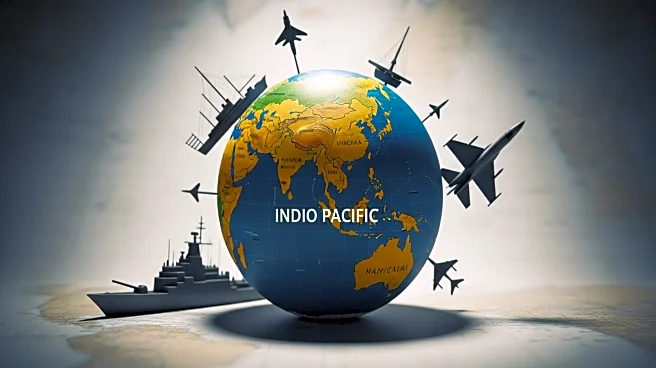What is the story about?
What's Happening?
During a Senate Armed Services Committee hearing, senators expressed concerns over the Trump administration's shift in national security focus, particularly regarding the Indo-Pacific region. Led by Sen. Roger Wicker, R-Miss., the committee questioned John Noh, the nominee for assistant defense secretary for Indo-Pacific security affairs, about the administration's decisions affecting alliances with Japan, South Korea, Australia, and Taiwan. Concerns were raised about the potential shift in defense strategy away from China and the Indo-Pacific, with Sen. Mark Kelly, D-Ariz., highlighting rumors of a focus on the Western Hemisphere. The hearing also addressed the cancellation of $400 million in military aid to Taiwan, with President Trump suggesting Taiwan should increase its defense spending.
Why It's Important?
The potential shift in U.S. defense strategy could have significant implications for international relations and security dynamics in the Asia-Pacific region. A move away from prioritizing China and the Indo-Pacific may weaken alliances and affect the U.S.'s ability to deter threats from China, Russia, and North Korea. The cancellation of military aid to Taiwan could strain relations and impact Taiwan's defense capabilities. These developments may alter the balance of power in the region and affect U.S. influence globally, with potential repercussions for trade, security, and diplomatic relations.
What's Next?
The confirmation of John Noh and the finalization of the new national defense strategy will be key in determining the future direction of U.S. policy in the Indo-Pacific. The Senate's concerns may lead to further scrutiny and debate over the administration's decisions. Additionally, the impact on Taiwan's defense spending and its relationship with the U.S. will be closely monitored. The administration's approach to military aid and alliances will likely continue to be a point of contention among lawmakers and international partners.
Beyond the Headlines
The broader implications of the Trump administration's policy shifts may include ethical and strategic considerations regarding the use of military aid and alliances. The potential realignment of priorities could lead to long-term changes in U.S. foreign policy and military strategy, affecting global stability and security. The administration's decisions may also influence domestic political dynamics, as lawmakers and stakeholders react to changes in defense and foreign policy.
















